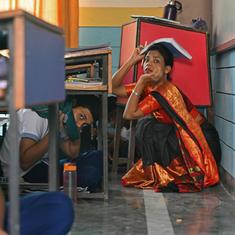Ayodhya verdict today: Here’s a timeline of the main events in the case
The Supreme Court heard the case for 40 days straight, making it the second-longest hearing in its history.

The Supreme Court will deliver its landmark judgement in the Ayodhya dispute at 10.30 am on Saturday. The verdict is on the cross-appeals filed by the Hindu and Muslim sides challenging the three-way partition of the disputed 2.77 acres of Ram Janmabhoomi-Babri Masjid land among Ram Lalla, Nirmohi Akhara and the Sunni Waqf Board in September 2010. A five-member Constitution Bench of the top court finished its marathon 40-day hearing on October 16.
Here is a look at what has happened so far in the case, leading up to tomorrow’s verdict:
- 1528: A mosque is built at the site by Mughal emperor Babur.
- 1885: Mahant Raghubir Das files plea in Faizabad district court seeking permission to build a canopy outside the disputed Ram Janmabhoomi-Babri Masjid structure. The court rejects the plea.
- 1949: Idols of Ram and Sita are placed under a central dome outside the disputed structure. It is not clear who placed these idols.
- 1950: Gopal Simla Visharad files a suit in Faizabad district court for the rights to worship the idols. The same year, Paramahansa Ramachandra Das also files a suit to continue prayers and keep idols in the structure.
- 1959: The Nirmohi Akhara files a third suit, seeking direction to hand over charge of the disputed site.
- 1981: The Uttar Pradesh Sunni Central Wakf Board files the fourth suit for declaration and possession of the site.
- February 1, 1986: The district court orders the removal of locks and opening of the site for Hindu worshippers.
- August 14, 1989: The Allahabad High Court orders maintenance of status quo in respect of the disputed structure.
- December 6, 1992: Babri Masjid structure is demolished.
- 1993: The Centre takes over the 67 acres of land around the area and seeks the Supreme Court’s opinion on whether there existed a Hindu place of worship before the structure was built. A number of writ petitions, including one by Ismail Faruqui, are filed at Allahabad High Court challenging the court order.
- October 24, 1994: Supreme Court says in the historic Ismail Faruqui case that a mosque was not integral to Islam.
- April, 2002: Allahabad High Court begins hearing to determine who owns the disputed site.
- March 13, 2003: In the Aslam alias Bhure case, Supreme Court says no religious activity of any nature can be allowed at the site.
- March 14, 2003: Supreme Court says interim order passed should be operative till disposal of the civil suits in Allahabad High Court to maintain communal harmony.
- September 30, 2010: A special full bench of the High Court of Allahabad rules three-way division of disputed area between Sunni Waqf Board, the Nirmohi Akhara and Ram Lalla.
- May 9, 2011: Supreme Court stays Allahabad High Court verdict.
- February 26, 2016: Subramanian Swamy files plea in the top court seeking construction of Ram temple at the site.
- March 21, 2017: Former Chief Justice of India Jagdish Singh Khehar suggests out-of-court settlement among rival parties.
- August 7, 2017: Supreme Court constitutes three-judge bench to hear pleas challenging the 2010 verdict of the Allahabad High Court.
- February 8, 2018: Supreme Court starts hearing the civil appeals.
- July 20, 2018: Supreme Court reserves its verdict.
- September 27, 2018: The top court declines to refer the case to a five-judge Constitution bench. It says the case will be heard by a newly constituted three-judge bench on October 29.
- October 29, 2018: A three-judge bench led by Chief Justice of India Ranjan Gogoi orders that the dispute appeals will be listed in January 2019 before an appropriate bench to fix a date for hearing.
- January 8, 2019: Supreme Court notifies that a five-judge bench led by the CJI and the next four future Chief Justices of India in line of seniority – Justices SA Bobde, NV Ramana, UU Lalit and DY Chandrachud – will hear the Ayodhya title dispute appeals.
- January 10, 2019: Justice UU Lalit recuses himself from the case and the top court reschedules the hearing for January 29 before a new bench.
- January 25, 2019: The top court reconstitutes five-member Constitution bench to hear the case. The new bench comprises Chief Justice Ranjan Gogoi and Justices SA Bobde, DY Chandrachud, Ashok Bhushan and SA Nazeer.
- February 26, 2019: The Supreme Court proposes a court-monitored mediation process between the Hindu and Muslim parties litigating the Ayodhya dispute. It gives eight weeks for the Muslim appellants to examine the official translation of Ayodhya case records.
- March 8, 2019: The top court refers the Ayodhya dispute for mediation. The mediators are former Supreme Court judge FMI Kalifulla, religious leader Sri Sri Ravishankar, and senior advocate Sriram Panchu
- August 2, 2019: The mediation panel fails to resolve the Ayodhya land title dispute case. The court decides to conduct daily hearings from August 6.
- August 6, 2019: The Constitution bench begins hearing the cross-appeals filed by the Hindu and Muslim sides challenging the three-way partition of the disputed 2.77 acres of the land.
- October 16, 2019: Supreme Court reserves Ayodhya verdict after 40-day marathon hearing.
- November 9, 2019: The Supreme Court will pronounce its judgement in the Ayodhya land dispute case.
Now, follow and debate the day’s most significant stories on Scroll Exchange.









